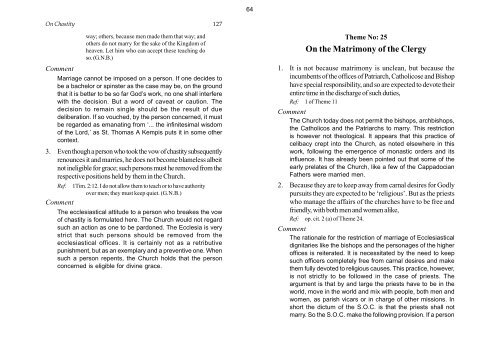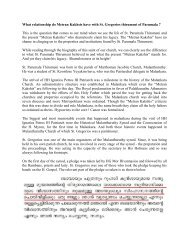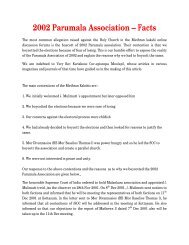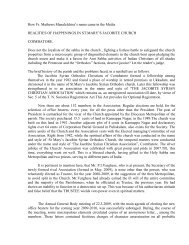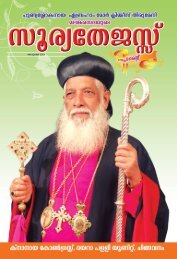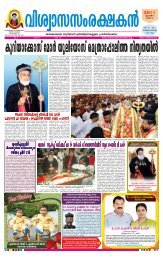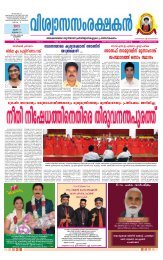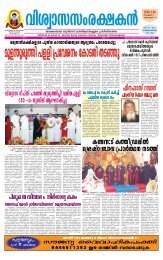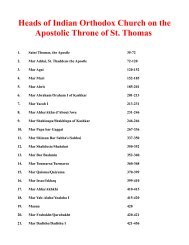Quintessence of Religious Doctrines - Malankarasyriac Voice
Quintessence of Religious Doctrines - Malankarasyriac Voice
Quintessence of Religious Doctrines - Malankarasyriac Voice
You also want an ePaper? Increase the reach of your titles
YUMPU automatically turns print PDFs into web optimized ePapers that Google loves.
64On Chastity 127way; others, because men made them that way; andothers do not marry for the sake <strong>of</strong> the Kingdom <strong>of</strong>heaven. Let him who can accept these teaching doso. (G.N.B.)CommentMarriage cannot be imposed on a person. If one decides tobe a bachelor or spinster as the case may be, on the groundthat it is better to be so far God’s work, no one shall interferewith the decision. But a word <strong>of</strong> caveat or caution. Thedecision to remain single should be the result <strong>of</strong> duedeliberation. If so vouched, by the person concerned, it mustbe regarded as emanating from ‘... the infinitesimal wisdom<strong>of</strong> the Lord,’ as St. Thomas A Kempis puts it in some othercontext.3. Even though a person who took the vow <strong>of</strong> chastity subsequentlyrenounces it and marries, he does not become blameless albeitnot ineligible for grace; such persons must he removed from therespective positions held by them in the Church.Ref: 1Tim. 2:12. I do not allow them to teach or to have authorityover men; they must keep quiet. (G.N.B.)CommentThe ecclesiastical attitude to a person who breakes the vow<strong>of</strong> chastity is formulated here. The Church would not regardsuch an action as one to be pardoned. The Ecclesia is verystrict that such persons should be removed from theecclesiastical <strong>of</strong>fices. It is certainly not as a retributivepunishment, but as an exemplary and a preventive one. Whensuch a person repents, the Church holds that the personconcerned is eligible for divine grace.Theme No: 25On the Matrimony <strong>of</strong> the Clergy1. It is not because matrimony is unclean, but because theincumbents <strong>of</strong> the <strong>of</strong>fices <strong>of</strong> Patriarch, Catholicose and Bishophave special responsibility, and so are expected to devote theirentire time in the discharge <strong>of</strong> such duties,Ref: 1 <strong>of</strong> Theme 11CommentThe Church today does not permit the bishops, archbishops,the Catholicos and the Patriarchs to marry. This restrictionis however not theological. It appears that this practice <strong>of</strong>celibacy crept into the Church, as noted elsewhere in thiswork, following the emergence <strong>of</strong> monastic orders and itsinfluence. It has already been pointed out that some <strong>of</strong> theearly prelates <strong>of</strong> the Church, like a few <strong>of</strong> the CappadocianFathers were married men.2. Because they are to keep away from carnal desires for Godlypursuits they are expected to be ‘religious’. But as the priestswho manage the affairs <strong>of</strong> the churches have to be free andfriendly, with both men and women alike,Ref: op. cit. 2 (a) <strong>of</strong> Theme 24.CommentThe rationale for the restriction <strong>of</strong> marriage <strong>of</strong> Ecclesiasticaldignitaries like the bishops and the personages <strong>of</strong> the higher<strong>of</strong>fices is reiterated. It is necessitated by the need to keepsuch <strong>of</strong>ficers completely free from carnal desires and makethem fully devoted to religious causes. This practice, however,is not strictly to be followed in the case <strong>of</strong> priests. Theargument is that by and large the priests have to be in theworld, move in the world and mix with people, both men andwomen, as parish vicars or in charge <strong>of</strong> other missions. Inshort the dictum <strong>of</strong> the S.O.C. is that the priests shall notmarry. So the S.O.C. make the following provision. If a person


